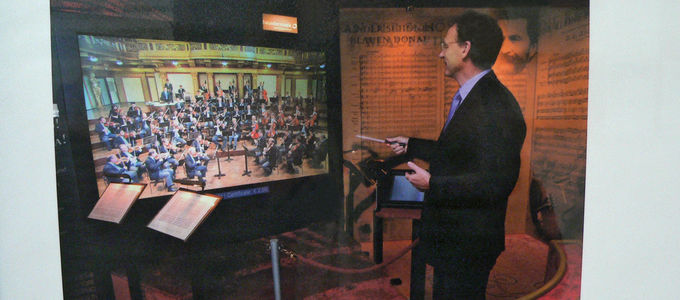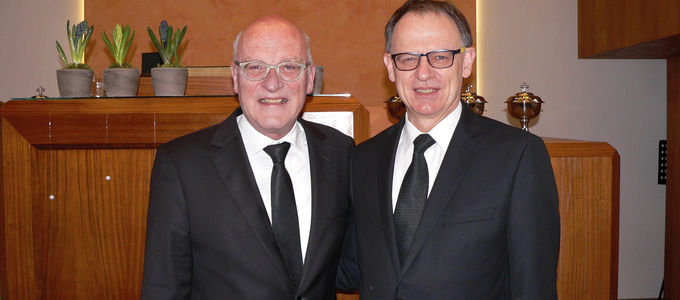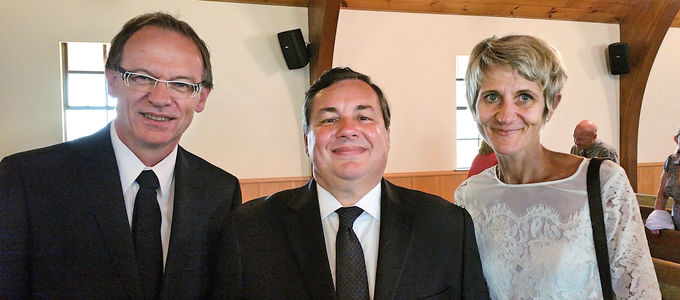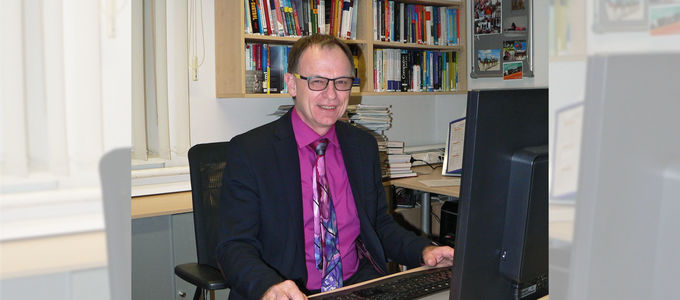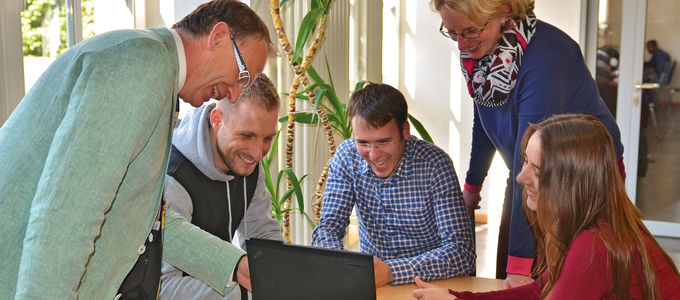
Faith and science—how do these two fields fit together? Dr. Max Mühlhäuser (58), dean of the faculty of computer science at the Technical University of Darmstadt and Evangelist in the congregation of Ober-Ramstadt in Germany, sees no contradictions here.
What do faith and science have to do with one another?
Science is characterised by a methodological process. It is important that those methods—that is, tried and true best practices—which count in science, be applied without a doubt. Results that are acquired in this manner are known as “established findings”. However, what we might describe as established findings today are often rendered obsolete by other findings tomorrow.
This means that we scientists are always in pursuit of the truth—in the awareness that we will never fully attain it. That is the first parallel to faith: we are always in pursuit of divine truth, and even though we may come a little closer to it here and there, we will never fully arrive at it for as long as we live here on earth.
The second parallel is as follows: even faith has method—and this too must proceed along tried and true methodology that is broadly accepted. Here prayer is an important “methodological instrument”. It is of proven value to occupy oneself with the word of God. It is a tried and true principle that if you wish to make experiences of faith, you must also immerse yourself as deeply as possible into the interconnections of faith. Those who barely occupy themselves with faith will not have many experiences of faith either!
What does faith mean to you?
Faith is a gift. We must be aware of this. The fact that I am able—and permitted—to believe is grace. That does not mean that I cannot do anything for it. If I explore my faith, if I occupy myself with it, then it will continue to inspire me again and again. I have never been so glad to be New Apostolic as I am today. For example, I am inspired by the way we approach other religions in the ecumenical context, by our understanding of personal responsibility, by our emphasis on the glad tidings in the divine services, and a thousand other things.
Not all members react that way to the developments in the Church …
Well, at times changes can be a little painful. That is just as true in faith as it is in the field of science. Yet it does us good to occupy ourselves with change, to reflect on what we are doing, and to call ourselves into question. I too have questions—and even doubts—from time to time. However, I have learned to deal with these. When I have trouble with a particular matter of faith, it usually does not take long for me to clear it up. I then set it aside in a special place in my mind. Sooner or later, I receive an answer: often I have to correct a personal interpretation, but there are other times when my understanding is confirmed.
Does your faith also play a role in your profession?
It certainly does. In my professional life, I try to live my faith as well as I can in practice. When it comes to talking about it, restraint is advised, however. In my professional environment there are many people—students, PhD candidates, secretaries, and so on—whom I am authorised to instruct, and there it would be inappropriate for me to engage in discussion about faith. It is easier to do so with colleagues. It is predominantly with colleagues that I often talk about matters of faith.
What does your faith help you accomplish?
An example: I pray that the right thing happens. Once you have commended your intentions to the hand of God, you often experience that God is with you, regardless of whether your intentions succeed or not. And that is beautiful. As a scientist, failures are inevitable. Then it is nice to feel God leading you, that it is always He who has the last word. Whenever I involve God in such situations, it is a great experience for me. At such times, God shows me again and again, “Yes, you have done good work, but look at where it ends. Your abilities simply have their limits, and you can do nothing to influence this.” And very often, it is precisely where the Lord shows me my limits that miracles occur.
Has your faith ever stood in your way professionally?
There was a time when I felt that way. That was at the time when many things were not allowed. For example, at that time I believed that I should not participate in various events that may have been good for networking—and thus for professional success. I would usually miss out on those evening events in order to take care of my duties in church, all out of a sense of duty. But in hindsight, I must say that God helped me establish harmony between my professional duties and those related to my faith. Today, when I tear myself away from a conference a little early in order to attend the divine service on Wednesday evening, I always make wonderful experiences: despite the initial hectic pace, I overwhelmingly experience beautiful divine services—and find this to be confirmation that I have made the right decision.
Is science more a matter of the head and faith more of a matter of the heart?
We all have a head and we all have a heart. In other words, we are all capable of logical and formal thought, as well as of emotion. Faith has more to do with feelings and sentiment, while science has more to do with logic and cognitive thinking. But the two go hand in hand. In a youth discussion, the Chief Apostle recently said, “I want you to use your heads!” In earlier times, we might not likely have put it that way. And yet, one must also engage one’s head for the sake of further development—even in church.
My profession has a great deal to do with thinking, but one must also be able to feel. After all, I also work with other people. And when it comes to technology, the way people embrace it is always important. I think that when a scientist only sees the technological possibilities and fails to engage his heart—or when a believer says that his intellect disturbs his faith—something is not in order.
Technological progress—does it always serve as an advantage?
We scientists develop things with the objective of making them useful to mankind. But there is always an element of every development that causes new problems. And then we researchers are challenged to do our part—within the scope of our abilities—to mitigate the negative consequences and further develop the positive aspects as far as possible. We cannot—and do not want to—simply “wish away” progress. Progress and technology, combined with social responsibility, have always been the order of the day—today more than ever.
What vision do you have with regard to our Church?
Since I deal with a lot of young people in my professional life, it is a concern to me that we seem to have less and less young people in our Church. My hope is that we will succeed in creating a diverse enough assortment of opportunities for involvement in the congregation to correspond to the diversity of the young people themselves. After all, we have all experienced personally that when we are committed to something, we are enthusiastic about it and are happy to be involved. For example, many of our young people are really enthused about our music—but others not so much. My personal dream is that other forms of contributions from our young people will one day also be firmly integrated into our daily congregational life.
One last question in conclusion: what is your motto in life?
Well, it would be too much to call it a motto in life, but I am suddenly reminded of a familiar quotation: “The best way of predicting the future is to shape it.” For me this applies equally to both faith and science.






